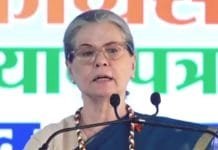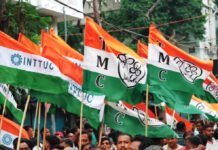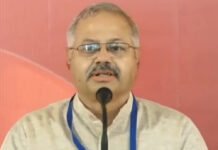Pawan Kalyan Challenges Tamil Nadu’s Language Policy
Andhra Pradesh Deputy Chief Minister and Janasena Party chief Pawan Kalyan has once again stirred a political debate by questioning Tamil Nadu’s opposition to the imposition of Hindi while simultaneously benefiting from the Hindi-speaking market. His remarks, made during the Janasena Party’s foundation day event, have drawn sharp reactions from various political quarters, including the Dravida Munnetra Kazhagam (DMK).
While speaking to his supporters, Pawan Kalyan pointed out what he perceives as double standards in Tamil Nadu’s language policy. According to him, Tamil Nadu’s political leaders strongly resist the spread of Hindi in the state, yet Tamil filmmakers do not hesitate to dub their movies into Hindi to reap massive profits from Bollywood audiences. His comments have reignited the long-standing debate surrounding language politics in India, especially in the southern states.
Pawan Kalyan’s Statement: A Call for Linguistic Unity?
During his speech, Pawan Kalyan made a series of pointed remarks, questioning Tamil Nadu’s logic behind opposing Hindi while benefiting financially from it. He stated:
“If Tamil Nadu is so opposed to Hindi, then why do they take money from Bollywood? Why do they dub their films in Hindi and earn crores? If you reject a language, shouldn’t you also reject the profits that come from it?”
The Janasena chief also argued that India’s linguistic diversity should serve as a unifying force rather than a divisive one. He emphasized that all languages—including Tamil—are crucial for maintaining the nation’s unity. Furthermore, he raised concerns about the apparent contradiction in Tamil Nadu’s policies regarding migrant workers from Hindi-speaking states such as Uttar Pradesh, Bihar, and West Bengal.
“Lakhs of people from Hindi-speaking states work in Tamil Nadu, contributing to the state’s economy. But when it comes to accepting Hindi as a language, they resist. Shouldn’t this mindset change?” he asked.
DMK’s Strong Rebuttal: “Beyond Facts”
Pawan Kalyan’s remarks did not sit well with the DMK, which has historically opposed the imposition of Hindi as part of its Dravidian identity and linguistic pride. Responding to his statements, DMK spokesperson Dr. Syed Hafizullah dismissed them as “beyond facts” and clarified Tamil Nadu’s stance.
“Tamil Nadu has never stopped anyone from learning Hindi. Our protest is only against the forced imposition of Hindi by the central government. There is a clear distinction between language policies and business decisions. Pawan Kalyan does not seem to understand Tamil Nadu’s stance on this issue.”
The DMK has consistently maintained that language choice should remain voluntary and that Hindi should not be imposed on non-Hindi-speaking states under any government policy.
BJP’s Support for Pawan Kalyan’s Stand
While the DMK opposed Pawan Kalyan’s statements, the Bharatiya Janata Party (BJP) came out in full support of his views. BJP leader Vikram Randhawa backed the Janasena chief’s statement, emphasizing that Hindi is India’s national language and should be promoted nationwide.
“The government wants to encourage the use of Hindi across the country. South India, including Tamil Nadu, should also embrace Hindi more openly. Pawan Kalyan has raised a valid question, and the mindset of linguistic exclusivity must change.”
The BJP has been a long-time advocate of the three-language formula, which includes Hindi, English, and a regional language. However, Tamil Nadu has consistently resisted this model, favoring its traditional two-language system of Tamil and English.
Language Politics and the National Education Policy (NEP) Debate
Pawan Kalyan’s comments come at a time when Tamil Nadu and the central government are locked in a dispute over the National Education Policy (NEP) and its three-language formula. The central government recently withheld Rs 2,152 crore under Tamil Nadu’s Samagra Shiksha Yojana, citing the state’s refusal to implement the NEP.
Tamil Nadu’s Opposition to the Three-Language Formula
Tamil Nadu has historically resisted the three-language formula, citing it as a veiled attempt to impose Hindi. The state government argues that such a move would give Hindi speakers an unfair advantage in national-level employment and marginalize regional languages like Tamil. The state has adhered to its two-language policy for decades, with Tamil and English as the primary mediums of instruction.
The DMK and other Tamil parties view the central government’s push for Hindi as a threat to linguistic diversity, while the BJP argues that a common language would enhance employment opportunities across India.
Implications of the Language Debate
Pawan Kalyan’s remarks have added fuel to the fire in an already sensitive debate over linguistic identity and national integration. The issue extends beyond Tamil Nadu, as other South Indian states like Karnataka and Kerala have also expressed reservations about the forced promotion of Hindi.
The economic aspect of the debate is also crucial. With the rise of pan-Indian films, South Indian cinema has heavily relied on dubbing into Hindi to expand its audience base. Films like Baahubali, KGF, and RRR have made record-breaking earnings in North India, proving that Hindi-speaking audiences play a vital role in the success of South Indian films.
Conclusion: The Lingering Debate on Hindi’s Role in India
Pawan Kalyan’s remarks have sparked a fresh round of debate on the linguistic divide in India. While he advocates for a more inclusive approach to language, his critics argue that his understanding of Tamil Nadu’s policy is flawed. Meanwhile, the BJP sees his statement as an opportunity to push its long-standing agenda of promoting Hindi as a unifying language.
As the debate over the National Education Policy and Hindi’s role in India’s linguistic landscape continues, it remains to be seen how political parties navigate this delicate issue. One thing is clear: language politics in India is far from settled, and discussions on linguistic inclusivity versus cultural preservation will persist in the years to come.
















